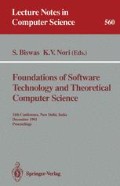Abstract
A poor signature consists of one (unary) function symbol, a symbol for equality and a number of constant symbols. Due to the lack of internal structure, interpretations of poor signatures differ from interpretations of richer signatures in some respects. One of them is the completeness of Hoare-like systems relative to the first-order theory of the interpretation.
We demonstrate that Hoare-like proof systems for partial correctness are incomplete in any infinite (and not uniformly locally finite) interpretation of a poor signature, even if the systems are supplied with the first-order theory of the interpretation. The reason is that there are always relations which are definable by while-programs but not by formulas. This is shown by an application of a result used in model theory. We also answer the question which enrichments of the signature are necessary and sufficient to allow (nontrivial) infinite interpretations where Hoare-like systems are complete.
The preparation of this article has been supported by the BMFT (ITS 9002 A). The responsibility for the contents lies with the author.
Preview
Unable to display preview. Download preview PDF.
References
Apt, K.R. Ten years of Hoare's logic: A survey—part I. ACM TOPLAS 3 (1981) 431–483.
Bergstra, J. A. and Tucker, J. V. Some natural structures which fail to possess a sound and decidable Hoare-like logic for their while-programs. TCS 17 (1982) 303–315.
Bergstra, J. A. and Tucker, J. V. Hoare 's logic for programming languages with two data types. TCS 24 (1984) 215–221.
Clarke, E. M., German, S. M. and Halpern, J. Y. Effective axiomatizations of Hoare logics. JACM 30 (1983) 612–636.
Cook, S. A. Soundness and completeness of an axiom system for program verification. SIAM J. Comp. 7 (1978) 70–90.
Friedman, H. Generalized Turing algorithms, and elementary recursion theory. in: Gandy and Yates (eds) Logic Colloquium '69, North-Holland, Amsterdam (1971) 361–390.
Gaifman, H. Finiteness is not a Σ 0-property. Isr. J. Math. 19 (1974) 359–368.
German, S. M. and Halpern, J. Y. On the power of the hypothesis of expressiveness. IBM Res. Rep. RJ 4079 (45457) Yorktown Heights (1983).
Grabowski, M. and Hungar, H. On the existence of effective Hoare logics. 3rd LiCS (1988) 428–435.
Harel, D. First-order dynamic logic. Springer LNCS 68 New York (1979).
Harel, D. and Peleg, D. On static logics, dynamic logics, and complexity classes. Inf. and Contr. 60 (1984) 86–102.
Kfoury, A. J. and Urzyczyn, P. Necessary and sufficient conditions for the universality of programming formalisms. Acta Inf. 22 (1985) 347–377.
Lipton, R. J. A necessary and sufficient condition for the existence of Hoare logics. 18th FoCS (1977) 1–6.
Loeckx, J. and Sieber, K. The foundation of program verification. 2nd ed., Wiley-Teubner (1987).
Marcus, L. Minimal models of theories of one function symbol. Isr. J. Math. 18 (1974) 117–131.
Olderog, E.-R. On the notion of expressiveness and the rule of adaptation. TCS 24 (1983) 337–347
Tiuryn, J. and Urzyczyn, P. Some relationships between logics of programs and complexity theory. TCS 60 (1988) 83–108.
Urzyczyn, P. A necessary and sufficient condition in order that a Herbrand interpretation is expressive with respect to recursive programs. Inf. and Contr. 56 (1983) 212–219.
Wand, M. A new incompleteness result for Hoare's system. JACM 25 (1978) 168–175.
Author information
Authors and Affiliations
Editor information
Rights and permissions
Copyright information
© 1991 Springer-Verlag Berlin Heidelberg
About this paper
Cite this paper
Hungar, H. (1991). Correctness of programs over poor signatures. In: Biswas, S., Nori, K.V. (eds) Foundations of Software Technology and Theoretical Computer Science. FSTTCS 1991. Lecture Notes in Computer Science, vol 560. Springer, Berlin, Heidelberg. https://doi.org/10.1007/3-540-54967-6_64
Download citation
DOI: https://doi.org/10.1007/3-540-54967-6_64
Published:
Publisher Name: Springer, Berlin, Heidelberg
Print ISBN: 978-3-540-54967-3
Online ISBN: 978-3-540-46612-3
eBook Packages: Springer Book Archive

